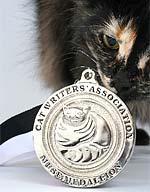 |
|||||||||||||||||||
|
|

We are the proud winners of the 2006 - 2009 winner of the Muse Medallion for Online Magazine by The Cat Writers? Association in their annual Communications Contest! (Photo courtesy of Weems Hutto).
On November 17, 2007 Felinexpress.com was honored to receive The President's Award by the Cat Writers' Association. We are very proud to have earned this distinction and will continue to provide quality information for all cat lovers.
Felinexpress.com Home > Cat Health > Cat Needs a Dentist |
When Your Cat Needs a Dentist
During their lifetime, cats will need dental work based on how long they live, their overall diet, lifestyle and health issues. Searching online, you will find various products used for preventive dental care; cat treats, special dry cat food, cat chew toys, even liver or chicken flavored toothpaste. You can buy a toothbrush that snaps on to the end of your finger for ease of brushing your cat’s teeth. (Not that brushing a cat’s teeth is always easy!) Similar to people, preventative dentistry includes brushing your cat’s teeth daily, dental check-ups annually (and if you suspect a problem) being proactive when it comes to taking care of dental issues. The proper diet plays an important role in keeping your cat’s mouth happy and healthy.
As cats continue to live longer, dental issues can cause your cat’s health and well-being to decline. Some danger signs include: perodontitis, gingivitis, oral ulcers, abscesses and even cancer. Periodontitis means inflammation has occurred around the tooth. You will see blood, swelling or redness forming around the tooth line. The cat may be reluctant to eat. This disease is a result of a build-up of plaque on the tooth. The plaque is white, slippery and can cause bad breath.
Plaque is a combination of food remains, bacteria, exfoliated cells and salivary glycoproteins. If the plaque remains on the tooth it will cause discoloration. Bacteria will thrive on the moist surface causing the cat’s immune system to release by-products when the white blood cells launch an attack against the invading bacteria. This movement causes the infection to merge into the bloodstream. The cat’s gums will bleed; become inflamed and painful causing behavior issues and food avoidance.
What is the difference between plaque and tartar?
Plaque forms when bacteria, mixed with saliva, blood cells, food debris and other bacterial components colonize. Quite often, plaque can lead to gum and tooth disease. Untreated, over time, the plaque becomes mineralized (hardens) and firmly attaches to the tooth. This eventually causes the gums to begin deteriorating and gingivitis forms.
If the cat’s tooth falls out, is the cat safe?
The bacteria remain behind to do its damage. The damage can be extensive to where the bacteria enters into the bloodstream affecting all the major organs of the cat’s body; liver, kidney, heart and lungs. Untreated, eventually, the cat will die.
How do I know when my cat needs dental work?
Here are some of the signs that your kitty is in need of a dental check-up:
- Bad breath
- Spitting out food
- Refusing to eat
- Pawing at the mouth
- Excessive drooling or salivation
- Build-up of tartar on the teeth
- Inflamed gums
- Bleeding gums
- Broken teeth
- Gum loss
- Vomiting after eating (mostly undigested food)
Don’t allow your personal feelings for dentists to get in the way of helping your cat. Before any type of dental surgery it is important to run blood-work so your vet can establish the cat’s health. Your cat will be anesthetized during the procedure and remain sore for a few days afterwards. If needed, your vet will send home pain medication and antibiotics. You will be required to offer a special diet suggested by your veterinarian so kitty can eat comfortably. In the meantime, grab that kitty toothbrush and special flavored cat toothpaste and get to work! There are teeth to be brushed.
More cat breeds |
|
? Copyright 2006-2010 Felinexpress.com, All Rights Reserved
Privacy Statement - Disclaimer - About Me


